| Srl | Item |
| 1 |
ID:
131647
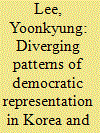

|
|
|
|
|
| Publication |
2014.
|
| Summary/Abstract |
This paper explains the difference between Korea's vocal movements and feeble parties versus Taiwan's stable parties and dependent movements from the political dynamics formed under the authoritarian state. Taiwan's party-based authoritarianism provided ground for party development but not for independent social movements. Korea's personal dictatorship was inimical to party development but engendered a contentious movement sector.
|
|
|
|
|
|
|
|
|
|
|
|
|
|
|
|
| 2 |
ID:
123359
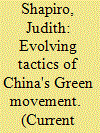

|
|
|
|
|
| Publication |
2013.
|
| Summary/Abstract |
The activists' strategies . . . reflect both the importance of new social media and the shifting constraints under which civil society must operate in an authoritarian state.
|
|
|
|
|
|
|
|
|
|
|
|
|
|
|
|
| 3 |
ID:
111158
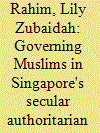

|
|
|
|
|
| Publication |
2012.
|
| Summary/Abstract |
The governance of Muslims in Singapore has been strongly shaped by the secular authoritarian state's commanding influence over Islamic institutions, such as the main religious bureaucracy Majlis Ugama Islam Singapura (the Islamic Religious Council), and reliance on draconian legislation, such as the Maintenance of Religious Harmony Act (MRHA), the Sedition Act and the Internal Security Act. Inter alia, these laws attempt to inoculate religion against politics, regulate religious activity and restrain the development of an autonomous Muslim civil society. The contradictions associated with the MRHA and no-tudung ('headscarf') policy are analysed within the framework of the authoritarian state's assertive secularism. The significance of localised socio-economic and political grievances in motivating a small number of Singaporean Muslims in supporting radical Islamist ideology is also considered.
|
|
|
|
|
|
|
|
|
|
|
|
|
|
|
|
| 4 |
ID:
178171
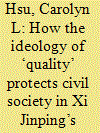

|
|
|
|
|
| Summary/Abstract |
Under Xi Jinping, the Chinese state has asserted authoritarian control over many aspects of civil society. Yet there is evidence that Chinese citizens are continuing to mobilize and organize with relative levels of success. This article examines one mechanism that prevents the Chinese state from eliminating civil society: the political ideology of suzhi (素质), translated as ‘quality’ in English. In the post-Mao era, the Chinese Communist Party (CCP) has increasingly invested its political legitimacy in its ability to deliver a rising quality of life to its citizens. This dynamic means that it is possible for Chinese citizens to mobilize and organize to achieve their goals. Suzhi ideology gives citizens one set of means to effectively limit undesirable behaviour by the state. It also provides citizens with leverage to make the state respond robustly to their needs and desires. It opens up possibilities for citizens to solve social problems on their own, without recourse to state actors. This article will examine four arenas of Chinese civil society which suzhi ideology protects under the Xi regime: media-inspired public outrage; public protests and demonstrations; NGOs as state consultants; and the increased accessibility of litigation.
|
|
|
|
|
|
|
|
|
|
|
|
|
|
|
|
| 5 |
ID:
159914
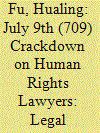

|
|
|
|
|
| Summary/Abstract |
This article first studies the 2015 crackdown on human rights lawyers in China and the context in which the crackdown took place. It then analyses the development of three types of human rights lawyers since 2011—the weiquan (rights protection) lawyers, the sike (die-hard) lawyers and the gongyi (public interest) lawyers—the interaction among them and the challenge they pose to the authoritarian governance. Finally, the article proposes three likely scenarios for human rights lawyering in China.
|
|
|
|
|
|
|
|
|
|
|
|
|
|
|
|
| 6 |
ID:
118258
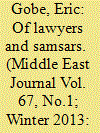

|
|
|
|
|
| Publication |
2013.
|
| Summary/Abstract |
The recent history of the Tunisian Bar was symptomatic of repeated attempts by President Ben 'Ali's authoritarian state to subjugate a profession which was meant to guarantee respect for the rule of law and defendants' rights. To this end, the state established an apparatus intended to control the workings of the legal services market and reduce the profession's capacity for self-regulation. This situation led to the development of illegal practices and influenced a majority of lawyers to support the mobilization against Ben 'Ali's regime.
|
|
|
|
|
|
|
|
|
|
|
|
|
|
|
|
| 7 |
ID:
125214
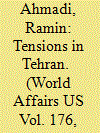

|
|
|
|
|
| Publication |
2013.
|
| Summary/Abstract |
In its first days under the Ayatollah Khomeini, the Islamic Republic of Iran was a competitive authoritarian state that, despite challenges of war, armed opposition, and difficult economic times, enjoyed a significant measure of stability. The Revolutionary Guards and paramilitary Basij force were charged with controlling the disenfranchised masses. But Khomeini understood the importance of allowing at least two factions of the political elite to compete for power and the control of policy. The leftist clergy, organized as the Association of Militant Clerics (Majmae Rohaniyoone Mobarez), and their allies advocated for a state-run economy and trade, while the rightist clergy, organized as the Society of Militant Clerics (Jamae Rohanyete Mobarez), and their financially powerful merchants (Bazaris), campaigned for privatization and free-market economy. Both groups developed extensive, mafia-like networks and both sought to establish a crony-run economy that benefited allies and members of their clan.
|
|
|
|
|
|
|
|
|
|
|
|
|
|
|
|
| 8 |
ID:
096431
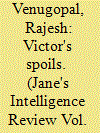

|
|
|
| 9 |
ID:
169052
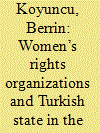

|
|
|
|
|
| Summary/Abstract |
In this article, we aim to explore the shift in the relationship between the state and women’s rights organizations (WROs) in Turkey in the post-2011 period, which was evinced in rising tensions between gender equality and gender complementarity discourses. We argue that, in the process of the vernacularization of global and/or international gender norms in Turkey, the conservative gender policy of the government corresponded to the endorsement of ‘gender justice,’ a particularistic approach formulated with reference to Islam. As such, the vernacularization of universal gender norms opened the way for the state in Turkey to solidify its legitimacy by instrumentalizing social divisions, marginalizing opposition WROs, and aligning with government-oriented organizations.
|
|
|
|
|
|
|
|
|
|
|
|
|
|
|
|